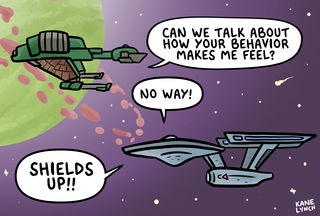Relationships
Defensiveness: An Enemy of Growth and Good Relationships
Three ways to prevent and tame defensiveness for your relationship's health.
Posted February 28, 2019 Reviewed by Davia Sills

Most of us can benefit from checking our defensiveness. People often think and act defensively to protect themselves from information that threatens them.
Denying, rationalizing, and justifying our unethical, inconsiderate, or immoral behavior, poor choices, failures, and poor performance is a balm for wounded egos and protects self-esteem. But our relationships are often better and our performance higher when we resist our defensiveness long enough to take our share of the responsibility and make needed changes.
Defensiveness isn’t only an enemy of personal growth and success; it’s also an enemy of close relationship satisfaction, growth, and success. Successful long-term relationships require cooperative problem solving and constructive conflict resolution.
Complaints and requests are made and responded to in ways that serve and strengthen relationship health and satisfaction. Disagreements are mutual problems to be cooperatively explored and resolved.
In response to a request, complaint, or concern, a defensive partner does one or more of the following:
- Denies, lies, and minimizes
- Insists the complainer is crazy or too sensitive
- “Cross-complains” (immediately meets the complaint with a counterattack or counter-complaint)
- Acts victimized and hurt to get the other person to back off
- Shuts down, says nothing, and leaves
Defensive responses usually make the complainer frustrated and angry and, ironically, defensive! This, of course, is the stuff fights are made of. When our partner is chronically defensive, we may give up on expressing concerns and complaints, because it’s unproductive, and we don’t want to fight. Meanwhile, we become resentful and emotionally distant from our partner, and our problems remain unsolved.
Takeaway #1
It’s natural to get defensive when your positive self-image is threatened by a complaint or criticism—but your defensiveness may not serve you, your partner, or your relationship.
Try: Swallow your pride, and strip away the more toxic aspects of an imperfectly communicated complaint or request.
Act more maturely than you feel, and engage with the legitimate aspects of the complaint or request, so that you can work things out with your partner. If you truly feel the complaint is off base, calmly share your perspective. Remember, it’s not about winning or getting your partner to back off; it’s about having a constructive conflict that strengthens your relationship.
Takeaway #2
It’s natural to make our complaints and requests when we are irritated, hurt, or mad. But this leads to aggressive, shaming communications that are likely to trigger partner defensiveness and destructive conflict.
Try: Think ahead about how to communicate your complaint best.
Avoid personality and character attacks and extreme statements that aren’t literally true (e.g., “You need to do your share of the dishes. You’re so selfish. You never think about me and how tired I am after working and cooking dinner. You just go watch TV, while I’m stuck cleaning up.”).
When making a complaint, focus on specific behaviors, and present them as mutual problems to be solved in a smooth, calm tone of voice (e.g., “Can we come up with a better plan for sharing the dish-washing? I appreciate that you do them sometimes, but I’m still doing most of them. I hate doing dishes, and I’m so tired after working and cooking dinner.”).
Takeaway #3
Defensiveness isn’t entirely avoidable. People are imperfect and spontaneous communicators, and they're very sensitive to ego-threatening information. But you can get the conversation back on track when a complaint or request triggers defensiveness.

Try: Nip defensiveness in the bud.
As soon as your partner acts “attacked,” don’t get mad and defensive about your complaint, and don’t respond with a counterattack. Instead, gently refocus. Restate your concern in a less loaded way.
For instance, you could say, “I see you’re upset because you think I’m saying you’re not a good partner. But that's not true. I love you. I just want to work together to figure out a better way to distribute chores, because it’s a problem for our relationship.”
Also try: Deescalate.
If the fight train has left the station, and it’s starting to derail, apologize for your extreme statements ("Look, that was unfair, I shouldn't have said that. What I should have said was…"). Restate their position to show you’re now listening ("Am I getting this right? Is your point that…"). Summarize their position as you understand it, and ask them to summarize yours.
Call a "time-out" if you need to ("Let's settle down and meet back here in 20 minutes"). Remember, the goal is mutual empathy and problem-solving.
Notes:
If your partner’s defensive responses take the form of violence or the threat of violence, you’re in an abusive relationship. Consider calling the National Domestic Violence Hotline for help (1-800-799-7233).
I’ve focused here on defensiveness as a cause of troubled relationships, but the truth is that it’s also an effect. When a relationship is troubled, partners are prone to viewing each other through critical lenses. A couple’s therapist may help. Also, see John Gottman’s Why Marriages Succeed or Fail.
Some partners, especially those with narcissistic or borderline personality traits, are prone to defensiveness no matter how their partner communicates concerns or complaints. Likewise, some partners are highly critical of us, no matter what we do. I’d think twice before settling down or staying with someone who requires we pretend they can do no wrong or seems to think we can do no right.




